Project Management Literature Review
VerifiedAdded on 2020/04/07
|7
|1527
|36
AI Summary
This assignment requires you to conduct a thorough literature review on the topic of project management. You will need to analyze various scholarly articles, books, and research papers to understand different project management concepts, methodologies, tools, and techniques. The review should cover areas such as project planning, execution, monitoring, and control, as well as emerging trends and challenges in the field. Additionally, you should critically evaluate the strengths and weaknesses of various project management approaches.
Contribute Materials
Your contribution can guide someone’s learning journey. Share your
documents today.
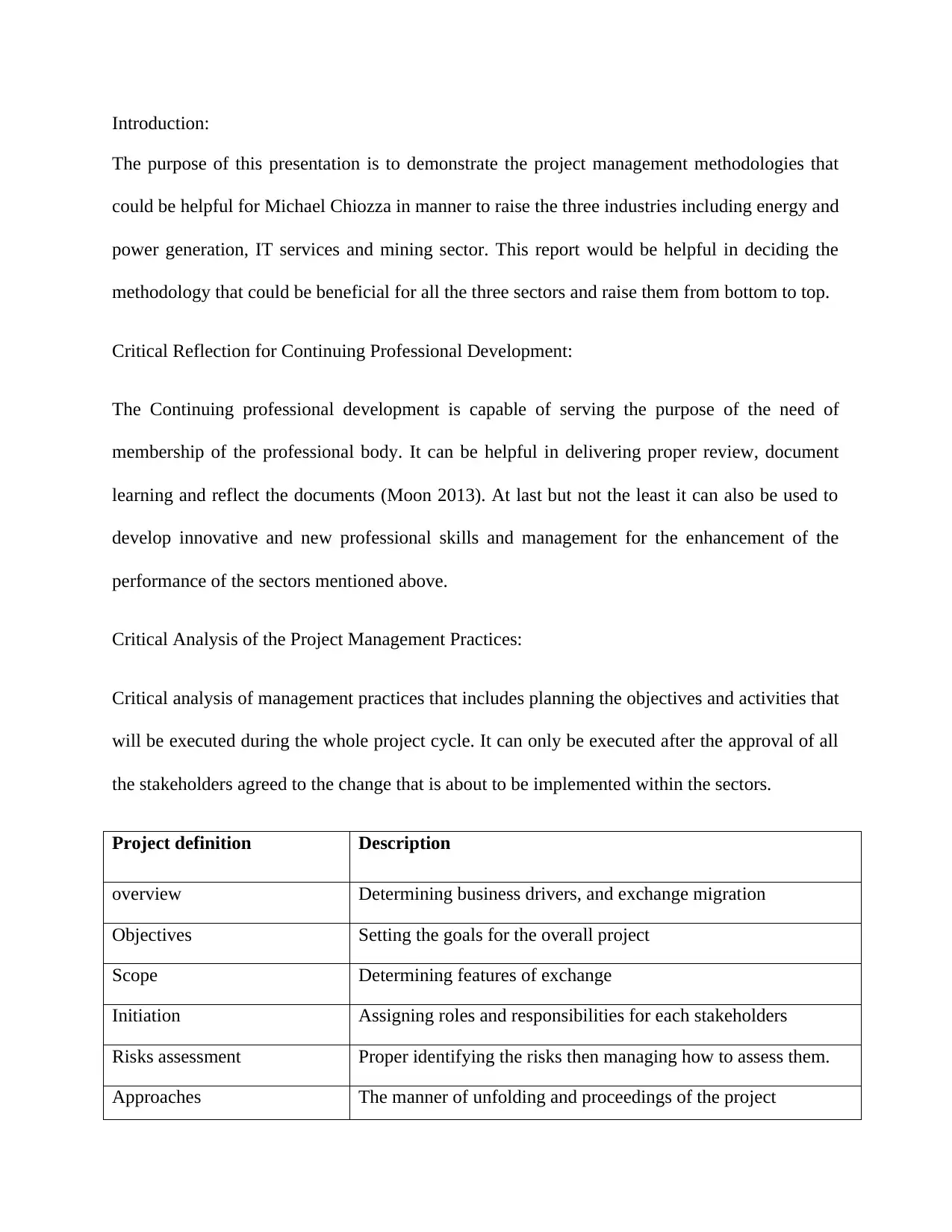
Introduction:
The purpose of this presentation is to demonstrate the project management methodologies that
could be helpful for Michael Chiozza in manner to raise the three industries including energy and
power generation, IT services and mining sector. This report would be helpful in deciding the
methodology that could be beneficial for all the three sectors and raise them from bottom to top.
Critical Reflection for Continuing Professional Development:
The Continuing professional development is capable of serving the purpose of the need of
membership of the professional body. It can be helpful in delivering proper review, document
learning and reflect the documents (Moon 2013). At last but not the least it can also be used to
develop innovative and new professional skills and management for the enhancement of the
performance of the sectors mentioned above.
Critical Analysis of the Project Management Practices:
Critical analysis of management practices that includes planning the objectives and activities that
will be executed during the whole project cycle. It can only be executed after the approval of all
the stakeholders agreed to the change that is about to be implemented within the sectors.
Project definition Description
overview Determining business drivers, and exchange migration
Objectives Setting the goals for the overall project
Scope Determining features of exchange
Initiation Assigning roles and responsibilities for each stakeholders
Risks assessment Proper identifying the risks then managing how to assess them.
Approaches The manner of unfolding and proceedings of the project
The purpose of this presentation is to demonstrate the project management methodologies that
could be helpful for Michael Chiozza in manner to raise the three industries including energy and
power generation, IT services and mining sector. This report would be helpful in deciding the
methodology that could be beneficial for all the three sectors and raise them from bottom to top.
Critical Reflection for Continuing Professional Development:
The Continuing professional development is capable of serving the purpose of the need of
membership of the professional body. It can be helpful in delivering proper review, document
learning and reflect the documents (Moon 2013). At last but not the least it can also be used to
develop innovative and new professional skills and management for the enhancement of the
performance of the sectors mentioned above.
Critical Analysis of the Project Management Practices:
Critical analysis of management practices that includes planning the objectives and activities that
will be executed during the whole project cycle. It can only be executed after the approval of all
the stakeholders agreed to the change that is about to be implemented within the sectors.
Project definition Description
overview Determining business drivers, and exchange migration
Objectives Setting the goals for the overall project
Scope Determining features of exchange
Initiation Assigning roles and responsibilities for each stakeholders
Risks assessment Proper identifying the risks then managing how to assess them.
Approaches The manner of unfolding and proceedings of the project
Secure Best Marks with AI Grader
Need help grading? Try our AI Grader for instant feedback on your assignments.
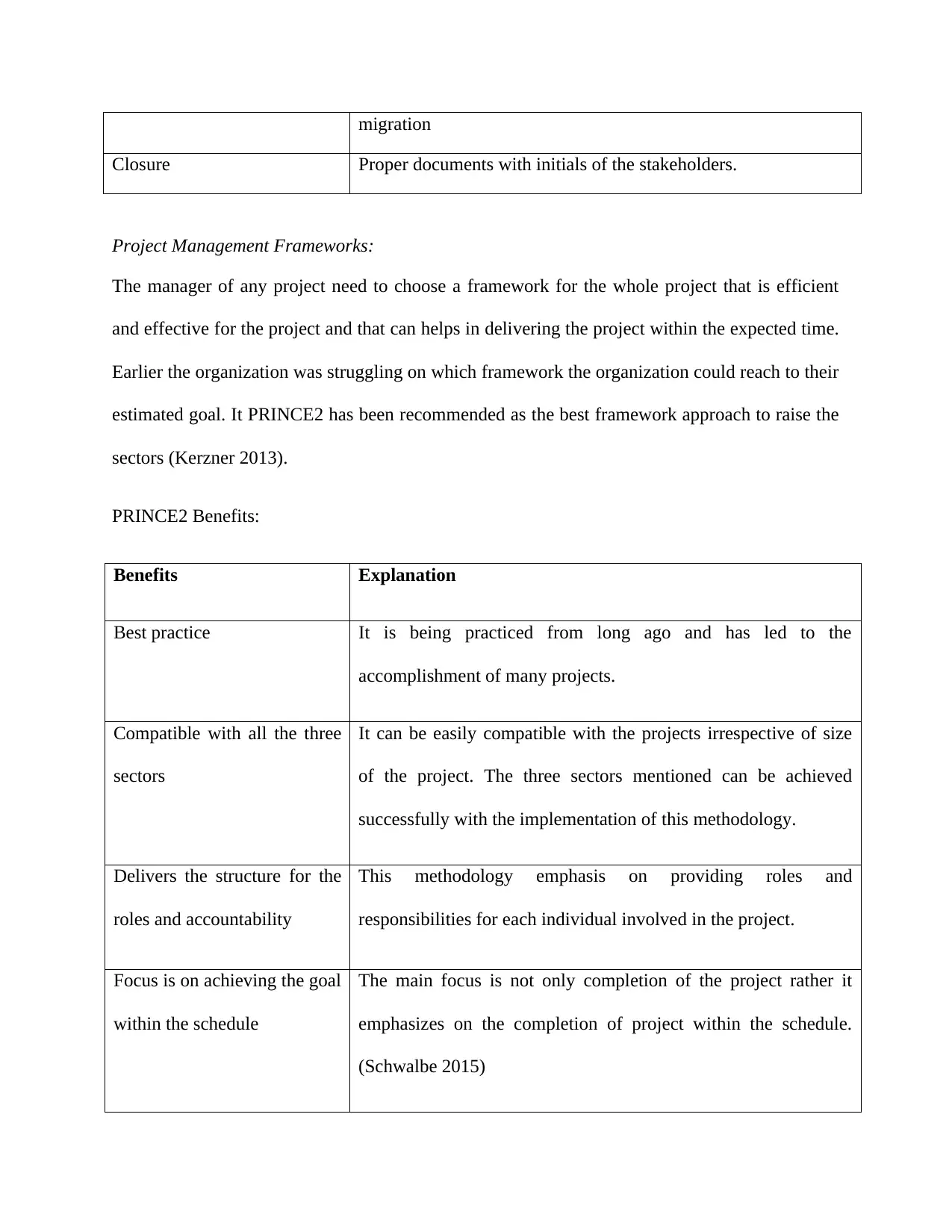
migration
Closure Proper documents with initials of the stakeholders.
Project Management Frameworks:
The manager of any project need to choose a framework for the whole project that is efficient
and effective for the project and that can helps in delivering the project within the expected time.
Earlier the organization was struggling on which framework the organization could reach to their
estimated goal. It PRINCE2 has been recommended as the best framework approach to raise the
sectors (Kerzner 2013).
PRINCE2 Benefits:
Benefits Explanation
Best practice It is being practiced from long ago and has led to the
accomplishment of many projects.
Compatible with all the three
sectors
It can be easily compatible with the projects irrespective of size
of the project. The three sectors mentioned can be achieved
successfully with the implementation of this methodology.
Delivers the structure for the
roles and accountability
This methodology emphasis on providing roles and
responsibilities for each individual involved in the project.
Focus is on achieving the goal
within the schedule
The main focus is not only completion of the project rather it
emphasizes on the completion of project within the schedule.
(Schwalbe 2015)
Closure Proper documents with initials of the stakeholders.
Project Management Frameworks:
The manager of any project need to choose a framework for the whole project that is efficient
and effective for the project and that can helps in delivering the project within the expected time.
Earlier the organization was struggling on which framework the organization could reach to their
estimated goal. It PRINCE2 has been recommended as the best framework approach to raise the
sectors (Kerzner 2013).
PRINCE2 Benefits:
Benefits Explanation
Best practice It is being practiced from long ago and has led to the
accomplishment of many projects.
Compatible with all the three
sectors
It can be easily compatible with the projects irrespective of size
of the project. The three sectors mentioned can be achieved
successfully with the implementation of this methodology.
Delivers the structure for the
roles and accountability
This methodology emphasis on providing roles and
responsibilities for each individual involved in the project.
Focus is on achieving the goal
within the schedule
The main focus is not only completion of the project rather it
emphasizes on the completion of project within the schedule.
(Schwalbe 2015)
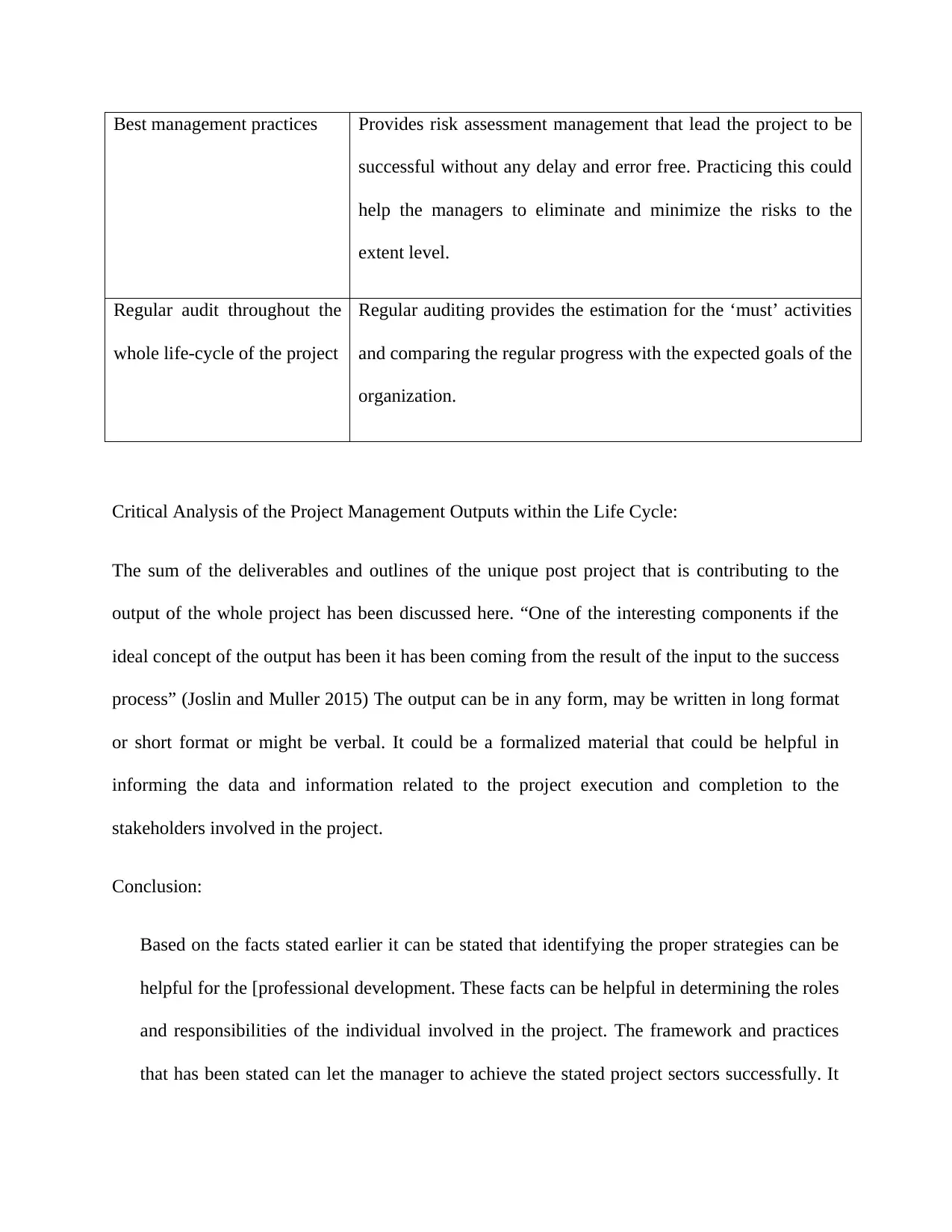
Best management practices Provides risk assessment management that lead the project to be
successful without any delay and error free. Practicing this could
help the managers to eliminate and minimize the risks to the
extent level.
Regular audit throughout the
whole life-cycle of the project
Regular auditing provides the estimation for the ‘must’ activities
and comparing the regular progress with the expected goals of the
organization.
Critical Analysis of the Project Management Outputs within the Life Cycle:
The sum of the deliverables and outlines of the unique post project that is contributing to the
output of the whole project has been discussed here. “One of the interesting components if the
ideal concept of the output has been it has been coming from the result of the input to the success
process” (Joslin and Muller 2015) The output can be in any form, may be written in long format
or short format or might be verbal. It could be a formalized material that could be helpful in
informing the data and information related to the project execution and completion to the
stakeholders involved in the project.
Conclusion:
Based on the facts stated earlier it can be stated that identifying the proper strategies can be
helpful for the [professional development. These facts can be helpful in determining the roles
and responsibilities of the individual involved in the project. The framework and practices
that has been stated can let the manager to achieve the stated project sectors successfully. It
successful without any delay and error free. Practicing this could
help the managers to eliminate and minimize the risks to the
extent level.
Regular audit throughout the
whole life-cycle of the project
Regular auditing provides the estimation for the ‘must’ activities
and comparing the regular progress with the expected goals of the
organization.
Critical Analysis of the Project Management Outputs within the Life Cycle:
The sum of the deliverables and outlines of the unique post project that is contributing to the
output of the whole project has been discussed here. “One of the interesting components if the
ideal concept of the output has been it has been coming from the result of the input to the success
process” (Joslin and Muller 2015) The output can be in any form, may be written in long format
or short format or might be verbal. It could be a formalized material that could be helpful in
informing the data and information related to the project execution and completion to the
stakeholders involved in the project.
Conclusion:
Based on the facts stated earlier it can be stated that identifying the proper strategies can be
helpful for the [professional development. These facts can be helpful in determining the roles
and responsibilities of the individual involved in the project. The framework and practices
that has been stated can let the manager to achieve the stated project sectors successfully. It
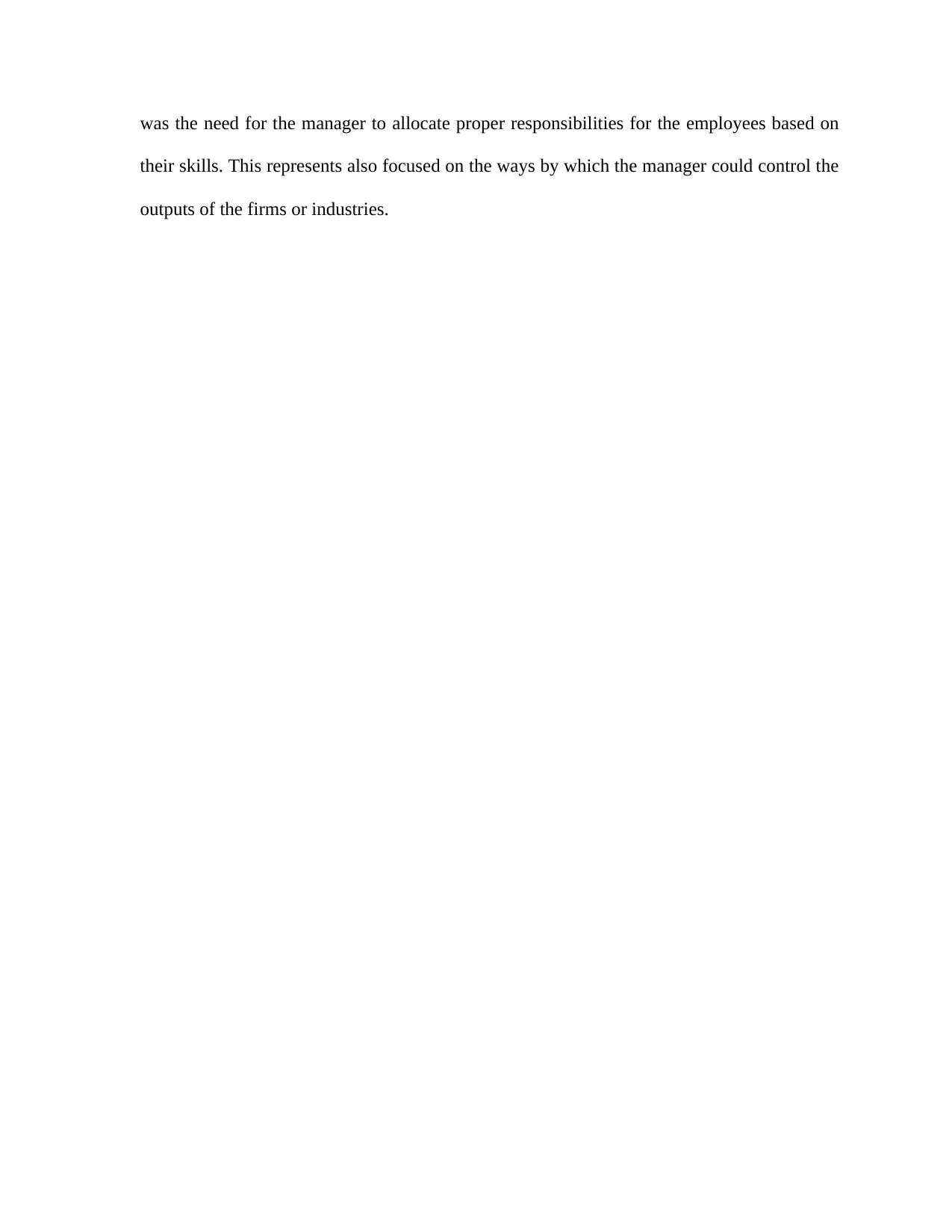
was the need for the manager to allocate proper responsibilities for the employees based on
their skills. This represents also focused on the ways by which the manager could control the
outputs of the firms or industries.
their skills. This represents also focused on the ways by which the manager could control the
outputs of the firms or industries.
Secure Best Marks with AI Grader
Need help grading? Try our AI Grader for instant feedback on your assignments.
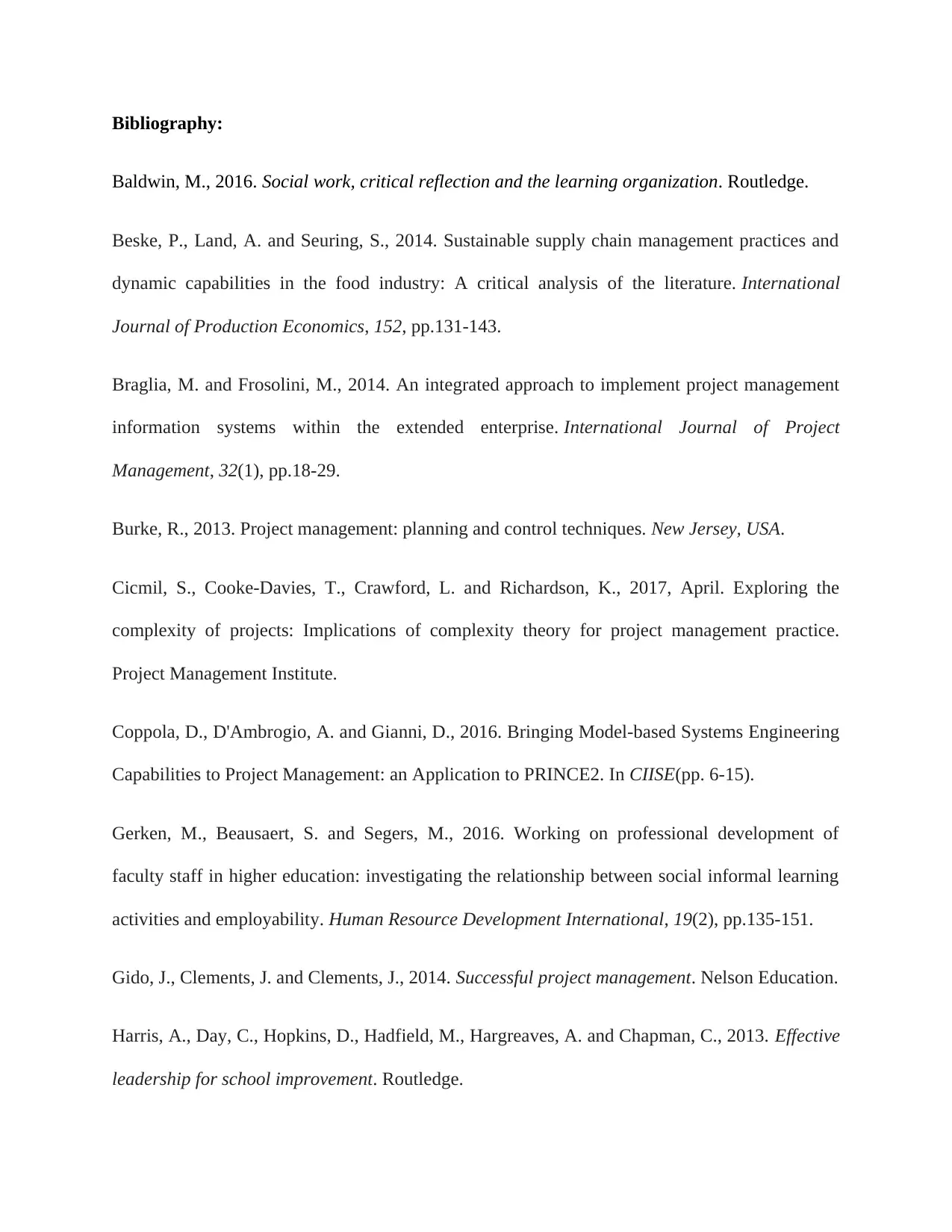
Bibliography:
Baldwin, M., 2016. Social work, critical reflection and the learning organization. Routledge.
Beske, P., Land, A. and Seuring, S., 2014. Sustainable supply chain management practices and
dynamic capabilities in the food industry: A critical analysis of the literature. International
Journal of Production Economics, 152, pp.131-143.
Braglia, M. and Frosolini, M., 2014. An integrated approach to implement project management
information systems within the extended enterprise. International Journal of Project
Management, 32(1), pp.18-29.
Burke, R., 2013. Project management: planning and control techniques. New Jersey, USA.
Cicmil, S., Cooke-Davies, T., Crawford, L. and Richardson, K., 2017, April. Exploring the
complexity of projects: Implications of complexity theory for project management practice.
Project Management Institute.
Coppola, D., D'Ambrogio, A. and Gianni, D., 2016. Bringing Model-based Systems Engineering
Capabilities to Project Management: an Application to PRINCE2. In CIISE(pp. 6-15).
Gerken, M., Beausaert, S. and Segers, M., 2016. Working on professional development of
faculty staff in higher education: investigating the relationship between social informal learning
activities and employability. Human Resource Development International, 19(2), pp.135-151.
Gido, J., Clements, J. and Clements, J., 2014. Successful project management. Nelson Education.
Harris, A., Day, C., Hopkins, D., Hadfield, M., Hargreaves, A. and Chapman, C., 2013. Effective
leadership for school improvement. Routledge.
Baldwin, M., 2016. Social work, critical reflection and the learning organization. Routledge.
Beske, P., Land, A. and Seuring, S., 2014. Sustainable supply chain management practices and
dynamic capabilities in the food industry: A critical analysis of the literature. International
Journal of Production Economics, 152, pp.131-143.
Braglia, M. and Frosolini, M., 2014. An integrated approach to implement project management
information systems within the extended enterprise. International Journal of Project
Management, 32(1), pp.18-29.
Burke, R., 2013. Project management: planning and control techniques. New Jersey, USA.
Cicmil, S., Cooke-Davies, T., Crawford, L. and Richardson, K., 2017, April. Exploring the
complexity of projects: Implications of complexity theory for project management practice.
Project Management Institute.
Coppola, D., D'Ambrogio, A. and Gianni, D., 2016. Bringing Model-based Systems Engineering
Capabilities to Project Management: an Application to PRINCE2. In CIISE(pp. 6-15).
Gerken, M., Beausaert, S. and Segers, M., 2016. Working on professional development of
faculty staff in higher education: investigating the relationship between social informal learning
activities and employability. Human Resource Development International, 19(2), pp.135-151.
Gido, J., Clements, J. and Clements, J., 2014. Successful project management. Nelson Education.
Harris, A., Day, C., Hopkins, D., Hadfield, M., Hargreaves, A. and Chapman, C., 2013. Effective
leadership for school improvement. Routledge.
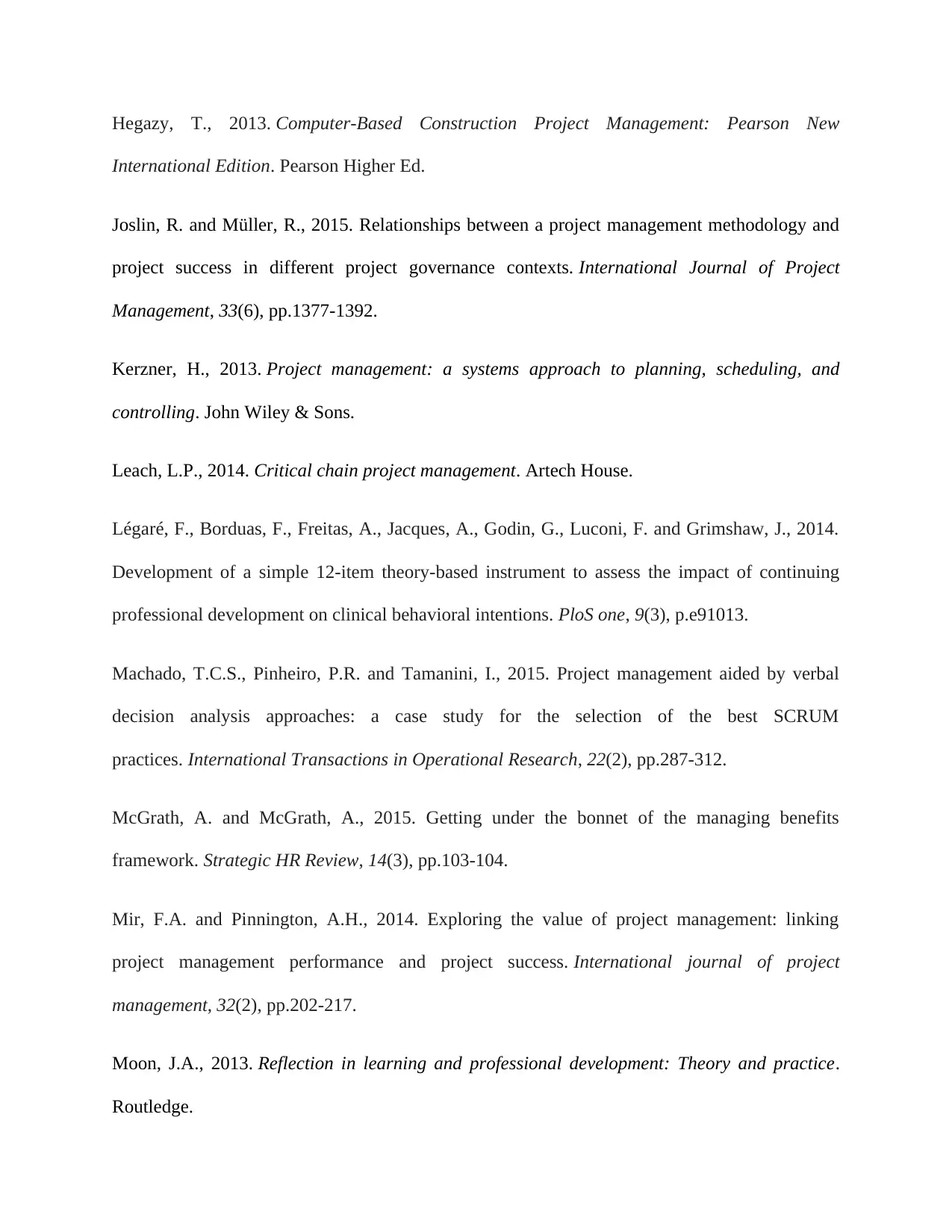
Hegazy, T., 2013. Computer-Based Construction Project Management: Pearson New
International Edition. Pearson Higher Ed.
Joslin, R. and Müller, R., 2015. Relationships between a project management methodology and
project success in different project governance contexts. International Journal of Project
Management, 33(6), pp.1377-1392.
Kerzner, H., 2013. Project management: a systems approach to planning, scheduling, and
controlling. John Wiley & Sons.
Leach, L.P., 2014. Critical chain project management. Artech House.
Légaré, F., Borduas, F., Freitas, A., Jacques, A., Godin, G., Luconi, F. and Grimshaw, J., 2014.
Development of a simple 12-item theory-based instrument to assess the impact of continuing
professional development on clinical behavioral intentions. PloS one, 9(3), p.e91013.
Machado, T.C.S., Pinheiro, P.R. and Tamanini, I., 2015. Project management aided by verbal
decision analysis approaches: a case study for the selection of the best SCRUM
practices. International Transactions in Operational Research, 22(2), pp.287-312.
McGrath, A. and McGrath, A., 2015. Getting under the bonnet of the managing benefits
framework. Strategic HR Review, 14(3), pp.103-104.
Mir, F.A. and Pinnington, A.H., 2014. Exploring the value of project management: linking
project management performance and project success. International journal of project
management, 32(2), pp.202-217.
Moon, J.A., 2013. Reflection in learning and professional development: Theory and practice.
Routledge.
International Edition. Pearson Higher Ed.
Joslin, R. and Müller, R., 2015. Relationships between a project management methodology and
project success in different project governance contexts. International Journal of Project
Management, 33(6), pp.1377-1392.
Kerzner, H., 2013. Project management: a systems approach to planning, scheduling, and
controlling. John Wiley & Sons.
Leach, L.P., 2014. Critical chain project management. Artech House.
Légaré, F., Borduas, F., Freitas, A., Jacques, A., Godin, G., Luconi, F. and Grimshaw, J., 2014.
Development of a simple 12-item theory-based instrument to assess the impact of continuing
professional development on clinical behavioral intentions. PloS one, 9(3), p.e91013.
Machado, T.C.S., Pinheiro, P.R. and Tamanini, I., 2015. Project management aided by verbal
decision analysis approaches: a case study for the selection of the best SCRUM
practices. International Transactions in Operational Research, 22(2), pp.287-312.
McGrath, A. and McGrath, A., 2015. Getting under the bonnet of the managing benefits
framework. Strategic HR Review, 14(3), pp.103-104.
Mir, F.A. and Pinnington, A.H., 2014. Exploring the value of project management: linking
project management performance and project success. International journal of project
management, 32(2), pp.202-217.
Moon, J.A., 2013. Reflection in learning and professional development: Theory and practice.
Routledge.
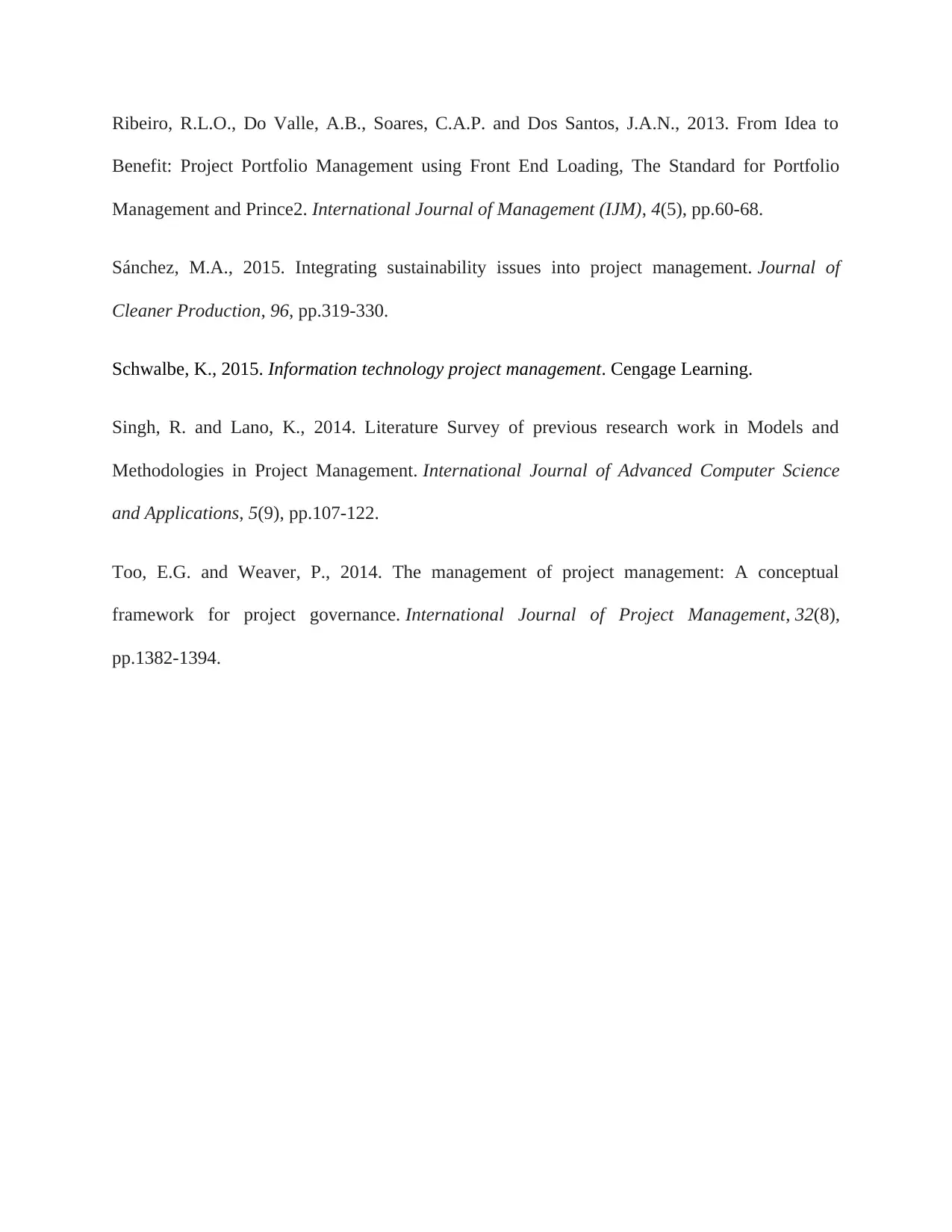
Ribeiro, R.L.O., Do Valle, A.B., Soares, C.A.P. and Dos Santos, J.A.N., 2013. From Idea to
Benefit: Project Portfolio Management using Front End Loading, The Standard for Portfolio
Management and Prince2. International Journal of Management (IJM), 4(5), pp.60-68.
Sánchez, M.A., 2015. Integrating sustainability issues into project management. Journal of
Cleaner Production, 96, pp.319-330.
Schwalbe, K., 2015. Information technology project management. Cengage Learning.
Singh, R. and Lano, K., 2014. Literature Survey of previous research work in Models and
Methodologies in Project Management. International Journal of Advanced Computer Science
and Applications, 5(9), pp.107-122.
Too, E.G. and Weaver, P., 2014. The management of project management: A conceptual
framework for project governance. International Journal of Project Management, 32(8),
pp.1382-1394.
Benefit: Project Portfolio Management using Front End Loading, The Standard for Portfolio
Management and Prince2. International Journal of Management (IJM), 4(5), pp.60-68.
Sánchez, M.A., 2015. Integrating sustainability issues into project management. Journal of
Cleaner Production, 96, pp.319-330.
Schwalbe, K., 2015. Information technology project management. Cengage Learning.
Singh, R. and Lano, K., 2014. Literature Survey of previous research work in Models and
Methodologies in Project Management. International Journal of Advanced Computer Science
and Applications, 5(9), pp.107-122.
Too, E.G. and Weaver, P., 2014. The management of project management: A conceptual
framework for project governance. International Journal of Project Management, 32(8),
pp.1382-1394.
1 out of 7
Related Documents
Your All-in-One AI-Powered Toolkit for Academic Success.
+13062052269
info@desklib.com
Available 24*7 on WhatsApp / Email
![[object Object]](/_next/static/media/star-bottom.7253800d.svg)
Unlock your academic potential
© 2024 | Zucol Services PVT LTD | All rights reserved.





